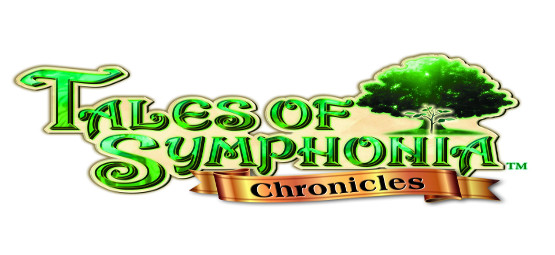It has been a long time coming to finally get a chance to play Tales of Symphonia for a PlayStation console outside of Japan. Originally released over 10 years ago for the Gamecube, this was my first experience with the Tales series and has long been one of my favorite RPGs. Now released on the PS3 along with Dawn of the New World, a Nintendo Wii release from 2009 that I also adore—but do these games stand the test of time, and can one of my favorite RPGs still shine brightly today?
Tales of Symphonia places you in the shoes of Lloyd Irving, a hot-headed kid who always seems to be getting into trouble, and his friends Collete and Genis. Collete has been named the chosen one and as such, you set out on a journey to revive the mana in the world and defeat the evil Desians. The journey isn’t an easy one, as you face plenty of tough opposition along the way. Thankfully, your friends, along with help from your teach Raine, a mercenary named Kratos (not the dude ghostly Spartan dude), and many more will help you along the way. While the story doesn’t deviate much from the usual JRPG cliches, it is rather nice to see a cast of characters not overshadowed by a whiney, pre-teen main character. In fact, I would argue that Lloyd is one of the better characters in the entire series and is a nice break from main’s like Luke fon Fabre of Tales of the Abyss. He has his moments, but overall is shown a very mature approach to his development and really none of the characters get annoying.
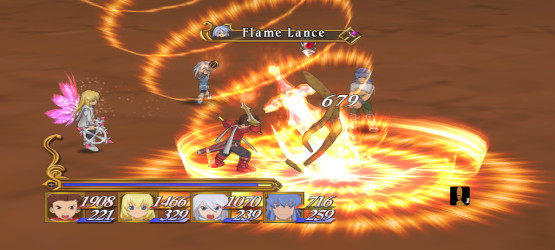
For fans of the series, there aren’t a lot of surprises in the game, as what they did 10 years ago is still holding mostly true to this day. It is a action-based combat system, where you control your player on a battlefield with the help of three others. It is real time, so you are moving around freely from monster to monster and repeatedly pressing the attack button in coordination with a direction on the analog stick. It can certainly feel a bit like a button masher at times, however, the addition of the analog stick to select a different type of attack adds enough variety and is needed for different kinds of monsters. Players will also have the ability to use EX skills, with four being assigned at a given time. These skills are a must in harder battles and use TP, which can then be regained through potions or hitting the opponents. Again, if you have played any of the recent Tales games, this shouldn’t be anything new for you and you should be able to pick up Symphonia in no time. You can also fill up the Unison guage through multiple hits and unleash a Unison Attack, where all four players attack in a row by pressing the corresponding buttons on screen for each one.
To make battles easier, you have the ability to set the strategy of your computer controlled friends, telling them whether to sit back and heal, go all out on attack, or use long range spells. This keeps you from having those “I hate this stupid AI” moments that can sometimes become frequent in video games. Outside of the combat and strategy, there are also weapons and armor that you must find or save up money for as well as titles. Titles can be earned through cutscenes or after battles and will alter attributes of your characters, improving things like health points or Defense. It is very beneficial for you to pay close attention to new titles and pick what suits your characters the best.
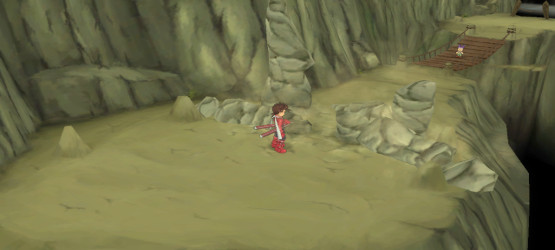
When you are not in combat or reading through the story, you will spend a majority of your time exploring the world map. This can seem rather daunting at times, and is especially true in the speed at which your character moves across the field. Actually, I should say lack of speed, as the movement seems almost at a snail’s pace. As you travel throughout the map, you will see your enemies as you get closer, allowing you to avoid them whenever need be. Some of them won’t give you a chance though, as they will dart out rather fast toward you. There are options out there to unlock more of the map without traveling all over, as you can pay the Katz Exploration Team to do map-making, show unvisited areas, missed items, and monsters. The world map’s radar has really seen better days, looking extremely ancient and blocky. I know this game is old, but it just blew my mind to see how ugly this part of the game turned out in the HD product. The world map itself really shows it’s age as well, with details of the landscape and towns being very subpar. Again, I know it sucks to nitpick a 10 year old game about graphics, but the game really shows its age and that is something shouldn’t get a free pass and that should be mentioned.
While on the topic of graphics, you can also see the age in character models, specifically facial expressions. Lord Botta for instance, looked extremely creepy with his face resembling something close to a monster. Towns actually don’t look too bad in the grand scheme of things and the cutscenes, while showing their age, do a good job of standing out. On the side of sound, voice work in the game is great, with each voice really fitting their respective characters and the English voice work should really be commended. Musically the opening score is very well done and the music throughout the game is great yet subtle, not ever overpowering. In fact, the only real issue I had with the sound was during combat, where you are greeted with a mixture of normal battle sounds, characters yelling attack names, and talking to each other. However, this is easily solved in the settings by turning down the volume of battle noises.
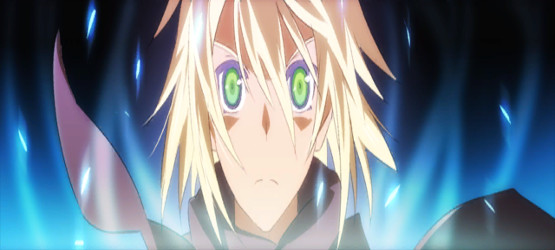
Now, this is a two-pack, hence the “Chronicles“, so let’s get to the second game, Dawn of the New World. This sequel/spin-off takes place years after the original, as things have not gone so smoothly as the heroes had hoped following the events of the first game. In Dawn of the New World, players take on the role of Emil, a young and insecure dude who is out to annoy the world, and avenge his parents as well. He is accompanied by his friend Marta, who wouldn’t mind being more but is often times left wondering just how clueless Emil really is. These two budding lovers are out on a mission to help save the world and unite the Sylvarant and Tethe’alla people. The story isn’t as strong as the original—it’s shorter than the original, and the characters just aren’t as great this time around. However, what is there is still solid yet unspectacular.
A lot has changed since the original game, yet the combat system remains mostly the same, with a few tweaks. The fighting still takes place on a field where you can freely run around and engage in the fast action combat at your discretion. One thing that changed with combat is the way you enter into each battle. In the previous game, you ran up to engage the enemy and it didn’t matter whether you caught them by surprise or not. However in DotNW, the way you approach an enemy has a repercussion in battles. Sneak up from behind and your enemies will start off the battle stunned, giving you a huge advantage. During the fight, you still have your four basic attacks along with your Unison attacks. This time around though, the Unison attacks are not based on button presses, but instead the allies nearest you will jump into the attack on their own accord.
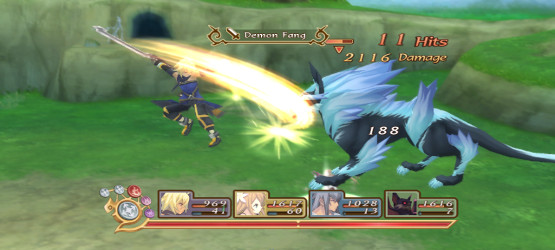
Perhaps the biggest area of change concerning the combat is with the ability to defeat monsters and have them join your party to fight along side Emil and Marta. Each monster that you recruit has a different type. For example water or dark monsters, and this provides different powers and skills to upgrade. As you capture monsters of, lets say, wind, you will want to strengthen them by joining their power to a current wind monster in your party, thus buffing your entire wind magic in general. These monsters can learn new skills for battle and you can also assign them 2 additional pieces of equipment, along with use your cooking skill to help them level up. The monsters add a really nice element to the combat and game, as now you will want to seek out certain monsters to try and tame them.
Equipment, items, and the character titles return in this game, as does cooking and synthesizing. However, skills are added to provide yet another way to customize your characters. Each person and monster in your party has a set amount of skill points at your disposal, with more acquired by leveling up. These skills do things like provide you with TP consumption, or better potions, improving your characters abilities in battle. The Katz Exploration Team is renamed the Katz Guild in DotNW and allows players to switch out their monsters, cook to strength their monsters, and also accept quests. These quests are a great way to gain EXP and items, making up for the fact that you don’t get experience while roaming the world map.
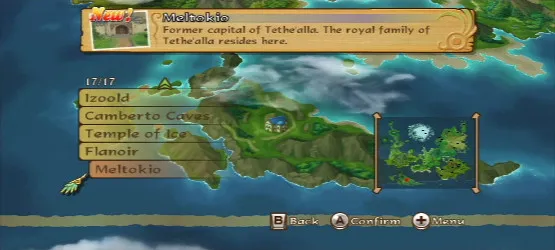
Speaking on the world map, it has seen a radical change from the original game. Gone is the free-roaming and encountering enemies, replaced now by simply selecting a place on the map for your guy to run to. To some, this might be a bad change, as it kills any exploration of the map, leaving you only dungeons and towns to explore. I, for one, love this new change. Yes, you lose the exploration but as someone who likes to get straight to the point, it is kind of nice to be able to just go from place to place without the hassle of running. The lack of exploration can really go both ways with gamers and it really boils down to personal preference.
Visually, this game is only about five years old compared to the 10 years of the original, so there are less visual issues compared to the original. However, as Dawn of the New World was a Nintendo Wii game, there are still some places where you can see the age in the game—however, the character models are a huge improvement over Tales of Symphonia. On the audio side, things get a little less pretty, with some fairly annoying voice work courtesy of Emil, who really isn’t a terrible character, but has some moments where you may want to physically assault him. A lot of the other characters are carry-overs from the original game and so if you liked them before, you will probably still like them, though they take a big backseat to Emil and Marta.
Tales of Symphonia Chronicles shows its age visually, there is no way to get around that and if you are a graphics snob, this isn’t the title for you. For those who can put that aside, you will be treated with two above-average RPGs full of memorable characters, an interesting story spanning two games, and an enjoyable combat system. The bundle is a great value, especially for those who never played either of these due to their Nintendo system releases in the States. In a year where there will be plenty of great role-playing experiences releasing, some people might be timid about spending their cash on two HD ports. To those people, I urge you to forget about these games are from the past and treat them as something fresh, just not as pretty. The games translate very well to modern times and are worth every penny spent to add them to your library, with at least 40 hours of gameplay in the first one alone. Oh, did I mention that they also have trophy support?
-
Two games for the low price of $40
-
Both games hold up well to the test of time
-
Engaging cast of characters
-
Fast and fun combat system
-
Added trophy support adds major value
-
Lack of World Map exploration in Dawn of the New World
-
Graphics show their age throughout
-
5 years later and Emil is still annoying
-
Lack of World Map exploration in Dawn of the New World
